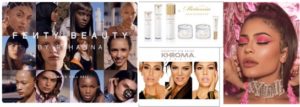Joanna Seddon, Managing Partner, Presciant
Marketers tempted by the idea of brand extension and licensing can learn a lot from this week’s New York Times fashion section, ’Celebrities Eyes Light Up for Makeup Bonanzas’. Tired of being spokespeople for other brands, more and more celebrities are extending their own brands into makeup and skincare (especially fast growing in the time of COVID), lured by the large market size and high margins. They are hoping at least to make a quick buck, and if they are lucky, build business empires.
The experience of Rihanna, Kylie Jenner, the Kardashians and others shows that extending a brand can be a huge source of risk-free profits. Or it can fail totally. The examples are extreme: Rihanna’s Fenty Beauty generated at least $570 million in its first 15 months, the Kardashian’s Khroma was immediately hit with a string of lawsuits and lasted less than a year. Its successor Kardashian Beauty also failed.
I can spot five key takeaways, applicable to any brand in any industry considering brand extension and licensing.
- You must have a new, exciting and relevant brand proposition. Fenty Beauty has a clear, strong and immensely relevant brand purpose – inclusivity. The tagline is ‘Beauty for all’. The line targets a huge and underserved market of women whose skin tones major brands don’t focus on. These include African Americans, who account for a stunning 85% of US beauty sales, as well as a wide range of other ethnicities. The Kardashian line, in contrast, had no clear purpose other than the narcissistic ‘to help young women attain the level of stunning beauty the Kardashian girls are known for’.
- The parent brand must fit with and be authentic to the beauty brand. Fenty Beauty embodies Rihanna’s image, her persona, her commitment to promoting diversity. She took years to develop the products and is deeply involved in the business. The Kardashians stepped back from their beauty lines and sat waiting for the licensing royalties to flow in. Kylie did much better than the other members of the family, by being deeply involved in her brand and making it personal. Worse are the teenage actress Millie Bobby Brown who posted a video of her skin-care range, in which she only pretended to use the products, which was obvious, because her makeup remained intact, and Alicia Keys, who is about to launch Keys Soulcare, her own line of makeup products, despite having famously sworn off using makeup in 2016.
- The products must be good quality and fit the brand proposition. Rihanna excels. Her line started with 40 shades of foundation (now 50), designed to fit all skin types and tones, far more than any other brand, her new fashion line caters to all body shapes and sizes. Kylie Jenner came up with the idea of ‘kit’s and ‘bundles’ which make it easy for consumers to recreate a look. Less successful celebrity beauty brands have come out with undifferentiated products (The Kardashian line consisted of mostly generic drugstore products available in very limited shades), gimmicky products (Melania’s ‘caviar’ line) or products that were just weird (such as Jessica Simpson’s line of sickly-sweet smelling ‘edible’ beauty products).
- Selecting the right partner is critical to the success or failure of any brand extension and licensing venture. The right partners can bring not only product development and manufacturing expertise, but also superior marketing and distribution capabilities. Once again, Rihanna sets the gold standard. Partnering with LVMH gave Rihanna immediate access to global distribution through every Sephora store (LVMH owns Sephora), as well as the production, R&D and commercial expertise of one of the world’s greatest brand marketers. Partnering with the wrong people can kill the business. Disputes with partners were a major cause of the demise both of Jessica Simpson’s and Melania’s lines.
- The legal basics must be covered – the trademark must be available and legally protected. Otherwise, lawsuits will drag the brand down, and in some cases kill it. This should go without saying, but apparently it doesn’t. The Kardashians overlooked a cosmetics brand called Kroma in Europe, which immediately sued. They had to kill the brand and relaunch under a new name.
If it works, yes, brand extension and licensing can make you millions. Look at Rihanna and Kylie. But don’t be too greedy – partnership agreements must benefit both sets of partners. Kylie Jenner sold Coty a majority share in her beauty brand for $600 M, but shareholders are now suing Coty for overpaying.
As the New York Times says, the last word must go to Lady Gaga. ‘The last thing the world needs is another beauty brand, but that’s too bad’. Just as well. Pharrell Williams is launching a skincare line, Humanrace, embracing inclusivity, the ‘humanizing’ trend, redolent of his childhood and love of the sea. Sounds promising…
Joanna Seddon is Managing Partner and CEO of Presciant, a new brand consultancy dedicated to optimizing ‘brand alpha’ : helping companies use brand to gain a financial edge. Before this, she was President, Global Brand Consulting at Ogilvy for 10 years. Prior accomplishments include creation of the BrandZ Top 100 global brand valuation ranking for WPP/Kantar. She is a board member and Past President of the AMA New York, Chairs the Marketing Hall of Fame and is the recipient of the 2020 MASB Marketing Accountability Award.
For more information, please visit: www.presciant.com
Also see the NYT article: https://www.nytimes.com/2020/11/19/style/celebrities-its-official-every-celeb-now-has-a-beauty-line.html?searchResultPosition=2
